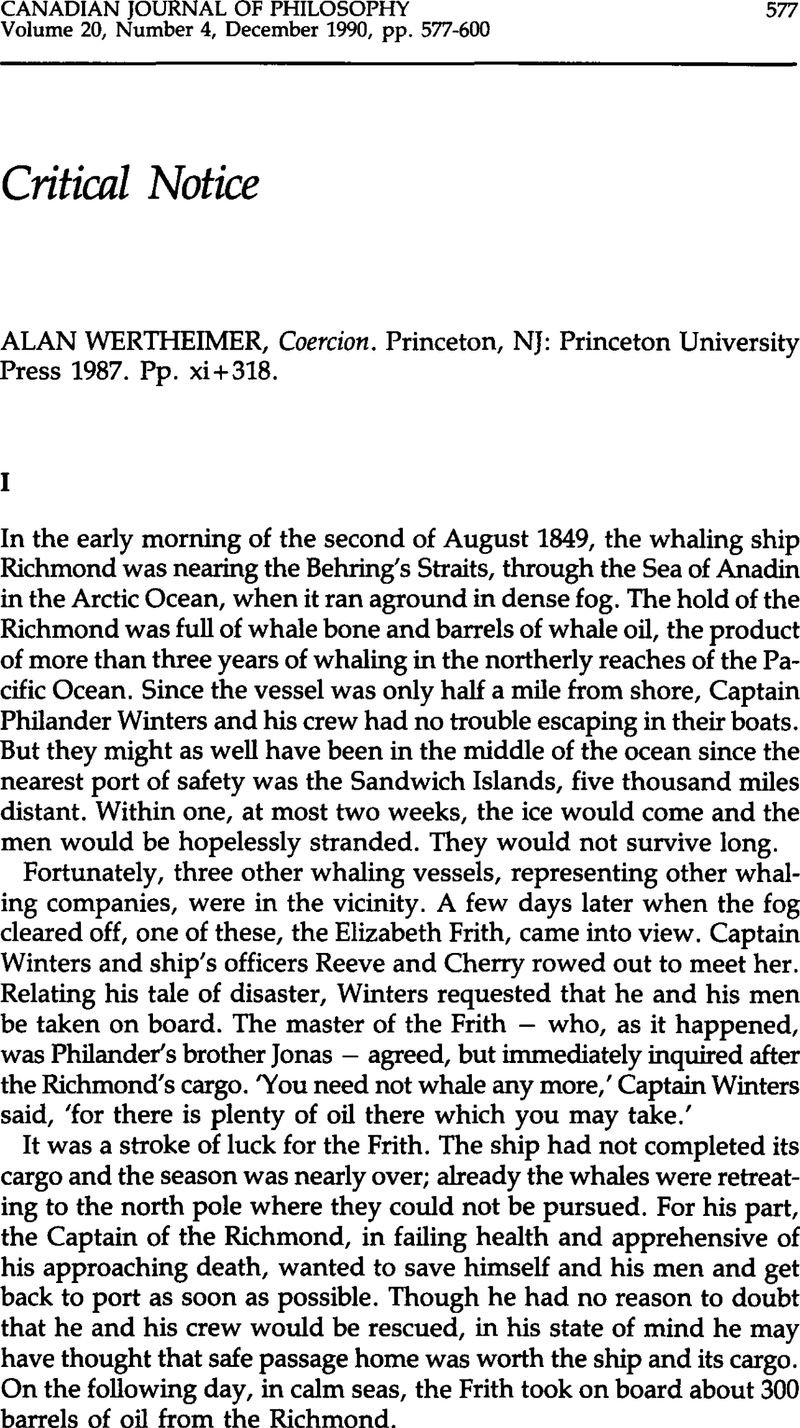No CrossRef data available.
Article contents
Alan Wertheimer Coercion. Princeton, NJ: Princeton University Press 1987. Pp. xi+318.
Published online by Cambridge University Press: 01 January 2020
Abstract

- Type
- Critical Notice
- Information
- Copyright
- Copyright © The Authors 1990
References
1 Post v. Lewis 60 U.S. (19 How.) 150 (1857). In setting out the facts of this case I confess to the exercise of a measure of literary license: owing to important gaps, and inconsistencies, in the facts as reported, creative legal reconstruction seemed warranted. My use of this case in what follows is strongly indebted to Ernest Weinrib's superb piece ‘The Case for a Duty to Rescue’ (Yale Law Review 90 [1980]247, 268-79).
2 Wertheimer's aim, though, is to develop a philosophical theory of coercion, not a legally acceptable theory; he realizes that the claim that a legal theory is philosophically defensible will itself cut no ice in a court of law.
3 The American Law Institute's ‘Restatements’ were originally published in the 1920s and 30s, though they have been regularly up-dated since then. They are neither summaries of the existing law nor guidelines for law reform, but a peculiar hybrid. Although extremely valuable as legal guides, it would not be correct to assume that they accurately characterize the law outside of the United States.
4 Wertheimer also considers legal contexts of·nonvolitional coercion- in particular, undue influence in wills and involuntary confessions. In these cases the question of whether the agent's will was overborne is treated as a matter of fact, a psychological observation about the degree of the agent's control over his or her actions. Wertheimer is correct, I think, in setting these cases aside, since they do not shine much light on the logic of coercive choices.
5 A clear exception to this rule is threatening to bring a civil action, or to initiate a criminal prosecution, when one has a legitimate cause of action or criminal complaint. Blackmail and extortion are also exceptions, but for a different reason: explicit legislation makes them illegal.
6 For a clear summary of the Canadian approach to restitutionary or ‘unjust enrichment’ cases - with an argument that Canadian courts should follow the American approach - see George B. Klippert, Unjust Enrichment (Toronto: Butterworths 1983).
7 Perhaps the philosophically most interesting - though uncompromisedly legal - discussion of unconscionability as a head of contract relief is found in S.M. Waddams, The Law of Contracts (Toronto: Canada Law Book 1977), Chapter 14.
8 Robert Nozick, Anarchy, State and Utopia (New York: Basic Books 1974), 262; his remarks here are based on his paper ‘Coercion’ in Sidney Morgenbesser, et al., Philosophy, Science and Method (New York: St. Martin's 1969).
9 Wertheimer gives this helpful example to explain why consent to life-saving surgery is voluntary even if there is ‘no reasonable alternative': a life-threatening illness does not violate your rights (63-4).
10 Unless, of course, it was not nature, but someone - my underpaid surgeon, for example - who caused the disease, and the coercive choice situation.
11 The case involves the criminal defence of necessity, where one acts ‘involuntarily’ to commit an offence, given options that have been limited by natural forces: see R. V. Perka (1984) 14 C. C. C. (3d), 385.
12 See the U.S. plea bargaining case of Bordenkircher v. Hayes 434 U.S. 358 (1978), discussed by Wertheimer at 133 and 216.
13 I am not, in other words, convinced by Wayne Sumner's thesis in The Moral Foundation of Rights (Oxford: Oarendon Press 1987).
14 See Michael Taylor, Community, Anarchy, and Liberty (Cambridge: Cambridge University Press 1982), 99, and Wertheimer at 201.
15 The purist would likely argue that our obligations to shysters, deceivers, and coercers are altered because they have forfeited their rights, to one degree or another. No doubt one could say this, but why insist on rights language here when the point is perfectly intelligible without it?
16 Post v. Lewis 60 U.S. (19 How.) 150 (1857), 159. And see Ernest Weinrib ‘The Case for a Duty to Rescue.'


